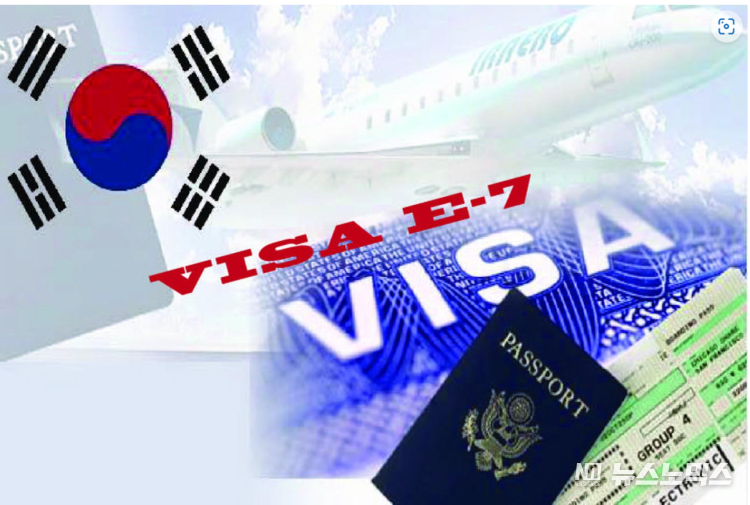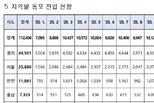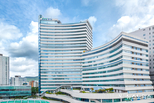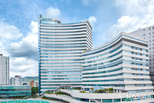
Newsnomics AJAY ANGELINA reporter | The Ministry of Justice will improve and implement E-7 visa system to strengthen competitiveness in the high-tech industry and help to resolve the shortage of labor in industry from January 2023.
For this purpose, the Ministry of Justice is introducing a newly formed E-7-S (Negative Visa) for those employed in high-tech industries and high-income earners.
The number of annual visas for skilled and skilled workers is increased, and the requirements for the professional worker visa (E-7) are eased.
The Ministry of Justice has prepared this improvement plan by actively accepting suggestions from industry and local governments, while taking into account the aspects of preventing infringement on people's jobs and the specific characteristics of each industry, and fully collected opinions from related ministries included Ministry of Strategy and Finance, Ministry of Science and ICT, Ministry of Culture, Sports and Tourism, Ministry of Agriculture, Food and Rural Affairs, Ministry of Trade, Industry and Energy, Ministry of Employment and Labor, Ministry of Maritime Affairs and Fisheries, etc.
E-7 visa categories and the essential improvements detail is as follows.
1-Negative Visa (E-7-S)
It will be newly established visa for those employed in high-tech industries and high-income earners.
So far, 93 foreign professional visas have been issued. Although visa issuance was allowed only for those specific occupations, but there was criticism that it did not actively respond to newly emerging industries and occupations in the era of the 4th Industrial Revolution.
Now Visa issuance is permitted for a wide range of occupations, except for some occupations*** with a gross national income (GNI) of per capita (3) three times or more, equal or greater than the gross national income The visas include; Professor (E-1), Conversation Guidance (E-2), Research (E-3), Technical Guidance (E-4), Professional Occupation (E-5), Performing Arts (E-6) and Specific Activities (E-4) -7) Visa for 87 occupations.
*The requirements will evaluate income, age, academic background, Korean language, etc.
**High-tech industries such as semiconductors, bio, and secondary batteries are the reachable techs.
***This visa allows Simple labor, general office work, jobs that go against good social customs, etc.
2- Skilled Worker Visa (E-7-4)
The number of skilled worker visas (E-7-4) issued annually will be greatly increased from 2,000 in 2022 to 5,000 in 2023.
As per data report given by the Ministry of Justice the number of skilled workers hired in previous years is 600 persons in 2017, 1,000 persons in 2019, 1,250 persons in 2021, 2,000 persons in 2022, and 5,241 persons employed as of November,2022.
It includes non-professional employment (E-9), Crew Employment (E-10), Visiting Employment (H-2) qualifications for those who have worked in the field of simple labor for more than 5 years, had skill of Korean proficiency, a system that selectively allows long-term employment by evaluating income, career, academic background, technical qualification, etc.
In the meantime, the number of annual visa issuance for skilled workers has been extremely limited, so there has been a continuous demand from industries to expand visa issuance for skilled workers.
Accordingly, the number of skilled workers visas (E-7-4) issued annually is increased (2,000 in 2022 → 5,000 in `2023), but visa issuance for foreigners with a history of illegal stay is restricted during the selection process.
3- Special Workforce Visa (E-7)
It allows relief of visa issuance requirements for professional skilled foreigners employed by small and mediumsized enterprises on the basis of wages.
1)Among the requirements for issuing a professional visa (E-7), the standard for foreign wages has been uniformly set high, so there has been criticism that it is difficult for small and medium-sized businesses to secure foreign workers. The average wage standard was of 80% for hiring the foreigners according to the previous year’s per capita gross national income (GNI), 31 million won per year) as of 2020 and 32 million won per year as of 2021) or more, that is higher than the average wage of SMEs(2.59 million won per month).
“Rather, it is a situation in which foreigners can be hired only when they pay a higher wage than domestic workers.” mentioned by Statistics Korea.
Accordingly, wage standards for visa issuance for foreigners employed by small and medium-sized venture companies and mid-sized companies in non-metropolitan areas will be relaxed among the professional worker visa (E-7) requirements. That can be applicable at least 70% of the previous year’s gross national income (GNI) per capita for a certain period of 3 years, around KRW 28 million per year as of year 2021.
2)Moreover, this visa requirement gives relief of easing and hiring foreigners to support the revival of the sluggish hotel and tourism industries, with the expansion of the maximum number of foreigners eligible from 2 to 5.
3)E-7 visa requirements for re-employment in Korea are eased in order to induce overseas companies return to Korea, or if a Korean company that has gone abroad moves back to Korea.
4)The requirements allow an invitation to a person as production manager if worked at overseas subsidiaries for more than 5 years → The improvements among overseas subsidiaries, allow those who have a degree in a related field to work for 6 months, and those who have a professional bachelor’s degree or technical license for 2 years or more.
5)According to the industry's suggestion, the current standards are too strict as the shipbuilders can only apply for a foreign welder invitation visa after a certain period of time (3 years) has elapsed since the company was established. Now, the employer criteria will be relaxed so that even start-ups that meet the requirements can apply for a foreign welder invitation visa.
Previously, the company with 10 or more full time workers and the annual average sales over 1 billion won for the past 3 years was eligible to hire a foreign employee.
But according to new improvements in Visa, the company with 10 or more full time workers and the annual average sales over 1 billion won for the past year is eligible for easing.
Han Dong-hoon, the Minister of Justice said, “The main direction of future immigration and immigration policies is to attract skilled workers and advanced scientific talents, not unskilled workers, so that they can voluntarily contribute to national development. In the process, we will strictly maintain the order of stay by thoroughly preventing illegal stays.”
Going forward, the Ministry of Justice will operate the visa system flexibly within the scope of not infringing on the people's jobs, promote the inflow of excellent talent, and promote the foreigner visa policy that helps the national economy by enhancing industrial competitiveness through fostering skilled manpower.










